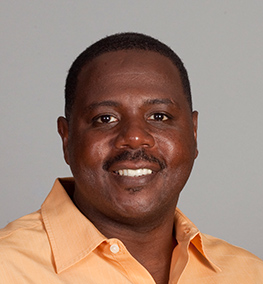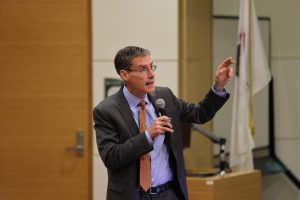Professor Darden on Police Reform and Building Connections

Photo Provided by COD
September 13, 2021
Police reform and community policing are two of the biggest topics discussed in our nation today. Defunding the police came up in response to the death of George Floyd. Some believe “defund the police ” to be in direct opposition to the police, however, this is not the case.
“Words have meaning, and you can use those words to put wedges between people… and so the words they should have used is that we need to reallocate our resources in a more appropriate manner, so as to serve our community better,” said professor Theo Darden, a criminal justice professor at the College of DuPage. “When you reallocate resources in terms of restructuring and rebuilding your social service network, and policing is a part of our social services, people fail to see that policing is a social service. It’s a human service, and we get away from that divide so we can function better as a society.”
Darden, along with Glen Ellyn Police Chief Philip Norton, will speak at a virtual meeting about community policing hosted by the League of Women Voters of Glen Ellyn on Thursday, Sept. 16.
“When you have better police and community relations, and you have your community resources structured in a way as to provide the appropriate social services to all people who need them, then you’re going to have a successful relationship and positive relationship with not only the police and the community, but between the community in general,” said Darden.
An idea that has been thrown out a lot is having more officers police the communities they come from. According to professor Darden that’s only part of it.
“Diversity is a good thing in terms of more women, more ethnic minorities, but that’s not the sole reason why things get better,” Darden said. “If [there is] a different philosophical approach, a different leadership approach, a different educational approach and a different training approach, all of those together in policing, those are the things [that] build better police-community relations.”
Darden also believes it’s time for local police departments to rethink their entry requirements to become a police officer.
“For agencies to say, ‘We require our officers to have a bachelor’s degree,’ then the next question becomes, ‘In what?’ I can have a bachelor’s degree in underwater basket-weaving, but what does that mean if I do not understand the human dynamic between a community and their police?”
Aside from the lack of proper education needed, the amount of time it takes to go from basic training to out in the field also seems absurd to Darden.
“How can it be that we can put a 21-year-old with a high school diploma…, with 10 to 14 weeks of basic training and 10 to 14 weeks of other training, so within six months we put you on the street and tell you to go out and deal with some of the most complex issues that human beings could ever know and expect them to always get it right?”
Besides better training, education and perhaps structural reform, building a stronger, more human connection between a community and its police department is critical.
“When I was a practicing police officer, any person I walked by, I looked them in the eye and said hello to them. I would have a human conversation with them, because in policing…, you respond to very little criminal activity, much more social disorder in most places.”
Sometimes it is easy to forget that being a police officer means being a public safety servant, Darden said.
“Words have meaning, and if you see yourself as a police officer, perhaps you start to act like one. But if you see yourself as a public safety servant, perhaps you start acting differently,” says Darden.



















